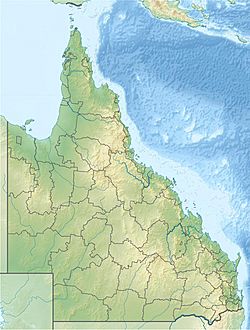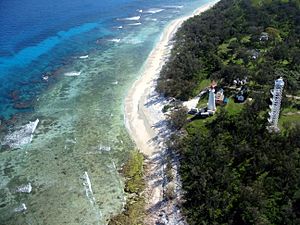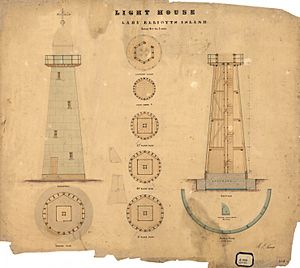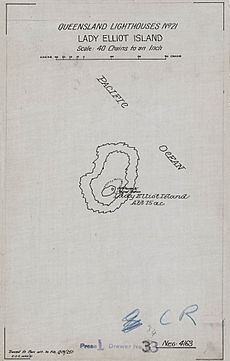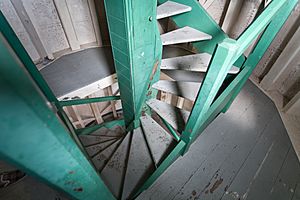Lady Elliot Island Light facts for kids
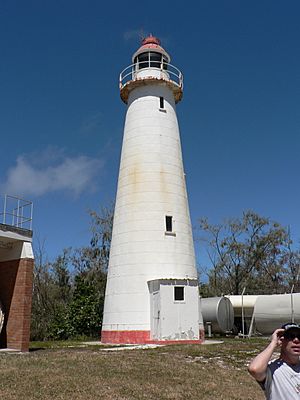 |
|
| The old Lady Elliot Island lighthouse | |
|
|
|
| Location | Lady Elliot Island Queensland Australia |
|---|---|
| Coordinates | 24°06′53″S 152°42′42″E / 24.11459°S 152.71156°E |
| Year first constructed | 1866 (first) 1873 (second) |
| Automated | 1982 |
| Deactivated | 1995 |
| Foundation | concrete tower |
| Construction | timber frame clad with galvanised wrought iron plates |
| Tower shape | conical tower with balcony and lantern |
| Markings / pattern | white tower and red dome |
| Height | 18 metres (59 ft) |
| Focal height | 24 metres (79 ft) |
| ARLHS number | AUS-2299 |
The Lady Elliot Island Light is a working lighthouse on Lady Elliot Island. This island is the most southern coral island of the Great Barrier Reef in Australia. It is about 46 nautical miles (85 km) north-east of Bundaberg, Queensland.
The lighthouse stands on the western side of the island. It was the third lighthouse built in Queensland after it became a state in 1859. It was also the very first lighthouse in Australia to be made with a timber frame covered in iron plates. The original lighthouse stopped working in 1995. A new, modern tower now holds the light close by.
Contents
History of the Lighthouse
Building the First Lighthouse
When Queensland became a state in 1859, it needed lighthouses to guide ships. In 1862, the government chose Commander George Poynter Heath to be the first Portmaster. His job was to manage the ports and navigation. By 1864, committees were looking for good places to build lighthouses. Lady Elliot Island was one of the spots they thought would be perfect.
The very first light on Lady Elliot Island was put up in 1866. This was a temporary light on a tall pole. It helped a company that was mining guano (bird droppings used as fertilizer) on the island. A big storm destroyed this light in 1871, but it was quickly rebuilt.
In 1872, plans were made for a new, permanent lighthouse. The Rooney brothers won the bid to build it for £749. They had also built several other lighthouses in Queensland. The Lady Elliot Island lighthouse was finished in 1873. It was the third lighthouse built in Queensland. The first two were Bustard Head Light (1869) and Sandy Cape Light (1870). By this time, the guano mining had removed most of the plants on the island. Goats brought to the island for food also ate any new plants. This left the island very open to strong winds and storms.
This lighthouse was special because it was the first of its kind in Australia. Other lighthouses before it used heavy cast iron pieces bolted together. But the Lady Elliot Island lighthouse used wrought iron plates. These plates were attached to a strong timber frame. This made the lighthouse cheaper to build. The iron plates were made in England and sent to the island. The timber frame was made in Brisbane and shipped there too. The original light was quite bright, shining at 4,000 candela (a measure of light intensity).
Only one lighthouse keeper lived at the station at first. Someone from the guano mining company helped out when needed. Only one small house was built for the keeper.
Changes Over Time
The guano mining stopped by 1874. Soon after, a second house was built for the lighthouse staff. The houses were rebuilt two more times. Three new houses were built in 1925, along with a boat shed and other storage sheds.
The light itself became much brighter over the years. In 1923, its brightness increased to 23,000 candela. In 1928, it was upgraded again to 85,000 candela. A weather station was added in 1939. In 1953, the lighthouse got electricity. In 1982, it became automated, meaning it could run by itself. However, people still worked there because the weather station was important. In 1988, the lighthouse keepers finally left. The light was changed to use solar power. On October 19, 1988, the last keepers left the island.
When the Old Light Stopped Working
In the second half of the 1900s, plants started growing back on the island. This eventually led to the old lighthouse being shut down. Lighthouse staff began planting trees in 1966. The goats that ate the plants were removed in 1969. Casuarina trees planted in 1969 grew very tall. By 1995, these trees were blocking the light from the old lighthouse.
So, the Australian Maritime Safety Authority (AMSA) built a new lighthouse. The old lighthouse was then turned off.
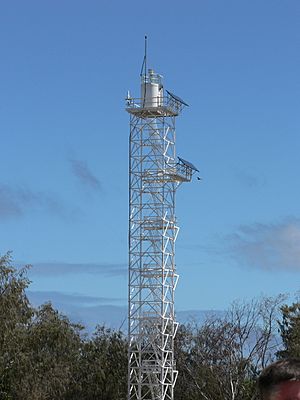 |
|
| The current Lady Elliot Island lighthouse | |
| Location | Lady Elliot Island Queensland Australia |
|---|---|
| Coordinates | 24°06′53″S 152°42′43″E / 24.11484°S 152.71188°E |
| Year first constructed | 1995 |
| Automated | 1995 |
| Construction | steel skeletal tower |
| Tower shape | square prisml tower with balcony and lantern |
| Markings / pattern | white tower and hut |
| Height | 105 feet (32 m) |
| Focal height | 125 feet (38 m) |
| Range | 20 nautical miles (37 km; 23 mi) |
| Characteristic | Fl W 7.5s. |
| Racon | B |
| Admiralty number | K2962 |
| NGA number | 111-10464 |
| ARLHS number | AUS-100 |
The New Lighthouse
The lighthouse working today is a tall, square tower made of steel. It has a white fiberglass hut on top with a viewing platform. This light runs completely by itself using solar power. It has six beams that flash white every 7.5 seconds. This light can be seen from 20 nautical miles (37 km) away. A racon (a special radar beacon) that shows the letter "B" is also on the tower.
Lighthouse Buildings
The Old Lighthouse Tower
The old lighthouse tower still looks much like it did when it was built. It is round and gets narrower towards the top. The bottom of the tower has a strong concrete base. The tower itself is made of a timber frame covered with thin, galvanized wrought iron plates. These plates are joined together with rivets and screwed to the timber frame. The tower is painted white. On top, it has a balcony and a lantern room, both painted white. The dome of the lantern is painted red. A small roof was added over the entrance at the base of the tower.
Inside the lighthouse, there are four levels with wooden floors. A central tube holds a winding wooden staircase that goes up to the third level. To reach the fourth level, the balcony, and the lantern, you use a fixed ladder.
Other Buildings
The lighthouse station also has three houses made of fibro (a type of building material) and other smaller buildings. These houses are about 50 meters from the lighthouse, which was common for lighthouse stations back then.
Other buildings near the lighthouse include an old power station, a workshop (which used to be a radio room), and a fuel storage shed. There is also a newer power station. These buildings used to be inside a fenced area, but the fence was removed in the late 1990s. There is also a boat shed, solar panels, and weather recording equipment on the site.
Visiting the Lighthouse
The new lighthouse is managed by the Australian Maritime Safety Authority. The entire area is looked after by the Queensland Parks and Wildlife Service. This is because it is part of the Great Barrier Reef Marine Park. You can only get to Lady Elliot Island by flying there.
 | Janet Taylor Pickett |
 | Synthia Saint James |
 | Howardena Pindell |
 | Faith Ringgold |


